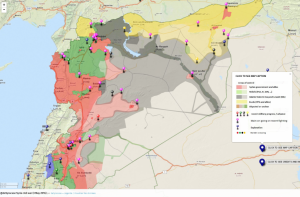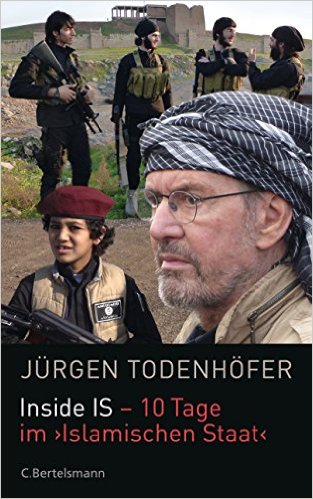Regular readers of this blog will be used to the topic jumping form politics to sustainability to geo-politics seemingly at random. The sequence has to do with what is going on at IESE Business School, what I experience going about my business and what is happening in the news cycle. I also think these issues are deeply linked.
ISIS on the ropes?

The current narrative in the news media is that ISIS is losing territory both in Syria and also in Iraq where the campaign to recapture Falluja is going on this week according to the BBC, Al jazeera, and most major news outlets. While re-taking the emblematic Iraqi city will certainly be a good thing, one has to ask what the cost will be to the estimated 50,000 residents who are trapped in the crossfire.
A number of news outlets including the Independent went with the headline that ISIS has lost 40% of the territory it had gained in Iraq and 20% of its gains in Syria thanks to coalition and Russian airstrikes which appear to continue despite reports some weeks ago that Russia was winding down its campaign. The problem is that it is difficult for ordinary people to substantiate such claims and who knows what is really happening on the ground. Syria Direct, a web site run by journalists, for example, reports that ISIS is still very strong and capable of hitting back.
Even scarier is a report published by the Institute for the Study of War run by Kimberley Kagan which states that the group is likely to launch major offensives during Ramadan, which starts next Tuesday, in Syria and Iraq, in new parts of the Middle East and also in Europe.
Mosul will be hell.
Back in December, 2014 a German journalist, Jürgen Todenhöfer, visited Mosul and felt that ISIS was firmly in cont rol of the city. The Guardian has published excerpts of a book he wrote about his experience and the group which unfortunately is only available in German! During another war a long time ago, Peter Arnett, a pulitzer Prize winning journalist, quoted an American Major as saying “It became necessary to destroy the town in order to save it” referring to the decision to shell Bến Tre, a provincial city which had been overrun by the Vietcong.
rol of the city. The Guardian has published excerpts of a book he wrote about his experience and the group which unfortunately is only available in German! During another war a long time ago, Peter Arnett, a pulitzer Prize winning journalist, quoted an American Major as saying “It became necessary to destroy the town in order to save it” referring to the decision to shell Bến Tre, a provincial city which had been overrun by the Vietcong.
Mosul is Iraq’s second largest city with a population of over 1 million people at least before the ISIS occupation 2 years ago. The key question, in my view is that as Iraqi troops and the Kurdish Peshmerga converge on Mosul in the next few days or weeks, will they fight or flee? If they fight, they will likely use the civilian population much as they appear to be doing in Falluja and the results could be truly horrific.
If they flee or simply melt away then they will continue to pose a threat.
What the different armies do in the next few weeks will decide the fate of the people of Mosul but even more significantly the shape of the continuing struggle against ISIS. If the offensive succeeds and Ramadan is relatively quiet, then perhaps there will be more hope for a lasting peace in the region. If it fails and/or ISIS does lash out, then it will only fuel those calls for the wests disengagement from parts of the Middle East.

